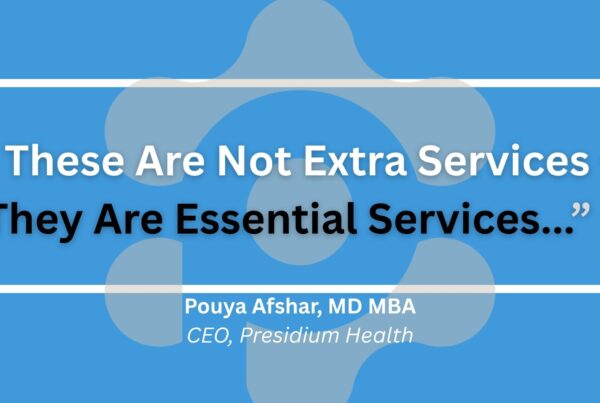”It Is A Lot Easier To Enter The Acute Health Care System Than Leave It"
Pouya Afshar, MD
Envision this:
You—or someone you love—are finally being discharged from an acute care hospital after a serious health scare. Maybe it was congestive heart failure exacerbation due to lack of access, a spike in blood pressure, or complications from pneumonia, which are commonly discussed in healthcare research journals. You leave with a pile of paperwork, a new list of medications, and plenty of good intentions—but often without enough real support, particularly for Medicaid patients.
That’s where the cracks in the health care system start to show.
What Types of Professionals Provide Transitional Care Services?
Transitional Care Services are provided by a diverse team of professionals, including physicians, nurses, social workers, case managers, and rehabilitation specialists. This multidisciplinary approach ensures comprehensive support for patients transitioning between care settings, promoting better health outcomes and reducing hospital readmissions during critical recovery periods.
Why TCS Is a Game-Changer for CalAIM’s ECM Model
This is the moment when transitional care services make all the difference. Explore our comprehensive Transitional Care approach These services guide patients and families through one of the most fragile phases of recovery—the days of discharge—when uncertainty is high and support is often inconsistent.
Thanks to California’s CalAIM initiative and Presidium Health’s Enhanced Care Management (ECM) program, transitional care isn’t a luxury—it’s a core part of delivering safe, effective, whole-person care.
- Preventing avoidable hospital readmissions
- Strengthening care coordination across all providers
- Connecting patients to home care, community resources, and caregiver supports
- Promoting health literacy and proactive engagement
- Elevating patient outcomes and overall quality of care with evidence supported in Google Scholar
Why the Days After Discharge Are So Risky
Walking out of the hospital doors may seem like the final step—but it’s actually the beginning of a high-risk phase.
The days of discharge are deceptively dangerous, especially for:
- Older adults managing multiple diagnoses
- Individuals facing complex care needs at home
- Families navigating confusing instructions or new medications
Without solid care coordination, these patients often face medication errors, missed appointments, or worsening health. Early intervention—such as contact within 24–48 hours—dramatically reduces setbacks.
The Real-World Gaps—and How TCS Fills Them
The modern health care system is fragmented. Transitional Care Services bridge these gaps by:
- Unifying communication across all providers
- Preventing disjointed handoffs that cause delays or poor outcomes
- Delivering holistic services for a smoother recovery
The Research: Transitional Care Gets Results
Backed by randomized clinical trials and healthcare studies, TCS is proven to reduce readmissions and improve outcomes—especially for patients with chronic illnesses or access barriers.
Measuring Success in ECM
CalAIM focuses on outcomes. TCS supports ECM success through:
- Reduced 30-day hospital readmissions
- Timely post-discharge follow-ups
- Successful home health care engagement
- Higher patient satisfaction scores
- Improved quality of care across settings
How Presidium Health Makes It Work
At Presidium Health, we embed Transitional Care Services at the heart of ECM strategy with a human-centered approach. Learn more about our Enhanced Care Management model and how we’re shaping the future of value-based care.
- Personalized Planning: Individualized care plans created early by interdisciplinary teams
- Fast Follow-Up: Contact within 24–48 hours of discharge, with 24/7/365 availability
- Seamless Coordination: We integrate care across hospitals, SNFs, home health, and primary care
- Family Empowerment: Tools and education so caregivers feel confident
- Social Barriers Removed: Help with food, transportation, housing, and more. See how community and social factors influence care transitions.
The Overlooked Transitions That Matter Most
Presidium Health specializes in high-risk transitions:
- Home to SNF: Fast identification and support when home is no longer safe
- Hospital to SNF: Comprehensive communication beyond discharge summaries
- ED to SNF: Rapid, informed placement decisions to prevent return visits
Proven Impact
Presidium Health tracks engagement, readmissions, satisfaction, and outcomes across every touchpoint to meet and exceed CalAIM ECM performance standards.
The Bottom Line: Transitional Care, the Right Way
Transitional Care Management isn’t about more paperwork—it’s about safer outcomes, empowered families, and compassionate care when it’s needed most.
Presidium Health ensures no one falls through the cracks.
The Bottom Line: Transitional Care, the Right Way
Transitional Care Management isn’t about more paperwork—it’s about safer outcomes, empowered families, and compassionate care when it’s needed most.
Presidium Health ensures no one falls through the cracks.




